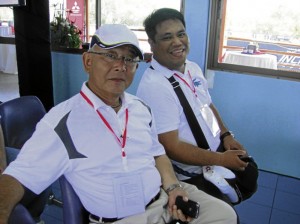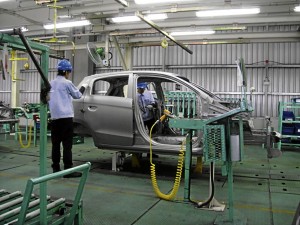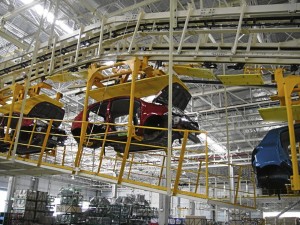
MITSUBISHI Motor Philippines Corp. executives Taizo Furuhashi and Froy Dytianquin (left photo) lead the visit by Philippine media of the Mitsubishi’s third factory in Laem Chabang, Thailand. AIDA SEVILLA-MENDOZA
No wonder many global car manufacturers have chosen Thailand as their export production base. The Thai government attracts investors or encourages those already based in the country to expand production by, among others, creating or adjusting excise tax rates in sync with changing trends in the world market. A good example is the Cabinet’s approval of the Ministry of Industry’s policy in June 2007 to promote the manufacture of fuel-efficient cars, also known as eco-cars, given the volatility of world oil prices and its effect on motor vehicle sales.
The construction of a third factory by Mitsubishi Motors Thailand in Laem Chabang industrial estate, 170 kilometers outside Bangkok, for the assembly of the Global Small car, the Mirage, followed the Ministry of Finance’s decision in October 2009 to slash the excise tax for small cars from 30 percent to 17 percent. Thailand’s eco-car promotion program recognizes and supports the global trend toward the manufacture of more fuel-efficient, environmentally friendly cars.
To qualify for the 17-percent tax rate in Thailand, a car must have an engine size of not more than 1.3 liters for gasoline engines and 1.4 liters for diesel engines. The car must consume not more than five liters of fuel per 100 kilometers, must not emit more than 120 grams of carbon dioxide per kilometer and must comply with the Euro 4 pollution standards set by the Thai Industrial Standards Institute, Ministry of Industry. The new Mirage easily meets these criteria.
The Ministry of Finance also agreed, effective January 1, 2008, to reduce the tax rate for cars using at least 20 percent of ethanol blends, with an engine size of not more than 3.0 liters.

Indeed, the Laem Chabang factories make up Mitsubishi Motors Corp.’s (MMC) second-largest export hub after Japan in MMC’s global production network.

